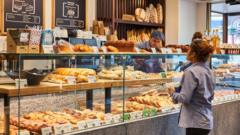The bakery chain aims to redefine the bakery landscape while highlighting Korean flavors and culture to a global audience.
Korean Bakery Chain Expands Global Reach with Creative Takes on Classic Breads

Korean Bakery Chain Expands Global Reach with Creative Takes on Classic Breads
Paris Baguette’s innovative approach to baking challenges traditional norms as it grows internationally.
As the sweet aroma of fresh pastries fills bustling malls in cities such as Singapore, lines stretch from counters filled with an eclectic mix of baked goods. Among these, Paris Baguette stands out, blurring the lines between traditional French-inspired treats and distinctly Korean offerings. The bakery chain, known for its vibrant store designs reminiscent of a Parisian café, operates six outlets in France and three in the UK, showcasing the influence of Korean culture in the global culinary scene.
"We are not just a French bakery; we embrace an international spirit," asserts Jin-soo Hur, president and CEO of SPC Group, the parent company of Paris Baguette. With its roots in a modest family bakery founded 80 years ago, the brand has evolved into a major player in the global bakery market, reporting sales of $5.6 billion last year while employing around 20,000 people.
Since its inception in 1988 as Korea's first international bakery brand, Paris Baguette has expanded to 4,000 locations across 14 countries and has ambitious goals to establish over 1,000 new stores worldwide by 2030, primarily focusing on the U.S. market. A factory set to be completed in Texas in 2027 will serve as its largest overseas production hub, catering to a growing North American consumer base.
Paris Baguette also emphasizes its connection to sports as a partner of the English Premier League's Tottenham Hotspur. This collaboration, along with previous partnerships with clubs like Paris St Germain, allows the chain to tap into the food and sports culture that resonates with fans and enhances its visibility.
Emphasizing convenience, Paris Baguette employs a method of delivering frozen dough to franchises, a strategy designed to streamline operations and meet increasing urban demand for quick foods. While Asian bakeries are renowned for a rich variety of baked goods, Paris Baguette continues to innovate by offering unique flavors such as matcha and red bean alongside traditional pastries.
As the wave of Korean culture gains popularity worldwide, culinary experts recognize an opportunity for Asian bakeries like Paris Baguette to thrive further. With a growing presence even in places like Italy, the desire for global flavors is rising.
However, the reliance on frozen dough raises questions about quality. Some culinary professionals argue that mass production sacrifices the artisanal qualities found in smaller bakeries. During a recent blind taste test, pastry chef Saveria Busato found the croissant made from frozen dough lacking in texture and flavor but appreciated traditional Korean baked goods like milk bread for their delightful qualities.
Despite rising costs and inflation impacting expansion goals, Hur remains committed to changing bread culture globally, stating, "If profit were our only aim, we would stay in Korea. We want to spread our vision and enrich communities worldwide." In a challenging economic landscape, Paris Baguette embraces bold innovation, underscoring its mission to introduce a diverse array of bakery delights to consumers around the globe.
"We are not just a French bakery; we embrace an international spirit," asserts Jin-soo Hur, president and CEO of SPC Group, the parent company of Paris Baguette. With its roots in a modest family bakery founded 80 years ago, the brand has evolved into a major player in the global bakery market, reporting sales of $5.6 billion last year while employing around 20,000 people.
Since its inception in 1988 as Korea's first international bakery brand, Paris Baguette has expanded to 4,000 locations across 14 countries and has ambitious goals to establish over 1,000 new stores worldwide by 2030, primarily focusing on the U.S. market. A factory set to be completed in Texas in 2027 will serve as its largest overseas production hub, catering to a growing North American consumer base.
Paris Baguette also emphasizes its connection to sports as a partner of the English Premier League's Tottenham Hotspur. This collaboration, along with previous partnerships with clubs like Paris St Germain, allows the chain to tap into the food and sports culture that resonates with fans and enhances its visibility.
Emphasizing convenience, Paris Baguette employs a method of delivering frozen dough to franchises, a strategy designed to streamline operations and meet increasing urban demand for quick foods. While Asian bakeries are renowned for a rich variety of baked goods, Paris Baguette continues to innovate by offering unique flavors such as matcha and red bean alongside traditional pastries.
As the wave of Korean culture gains popularity worldwide, culinary experts recognize an opportunity for Asian bakeries like Paris Baguette to thrive further. With a growing presence even in places like Italy, the desire for global flavors is rising.
However, the reliance on frozen dough raises questions about quality. Some culinary professionals argue that mass production sacrifices the artisanal qualities found in smaller bakeries. During a recent blind taste test, pastry chef Saveria Busato found the croissant made from frozen dough lacking in texture and flavor but appreciated traditional Korean baked goods like milk bread for their delightful qualities.
Despite rising costs and inflation impacting expansion goals, Hur remains committed to changing bread culture globally, stating, "If profit were our only aim, we would stay in Korea. We want to spread our vision and enrich communities worldwide." In a challenging economic landscape, Paris Baguette embraces bold innovation, underscoring its mission to introduce a diverse array of bakery delights to consumers around the globe.





















